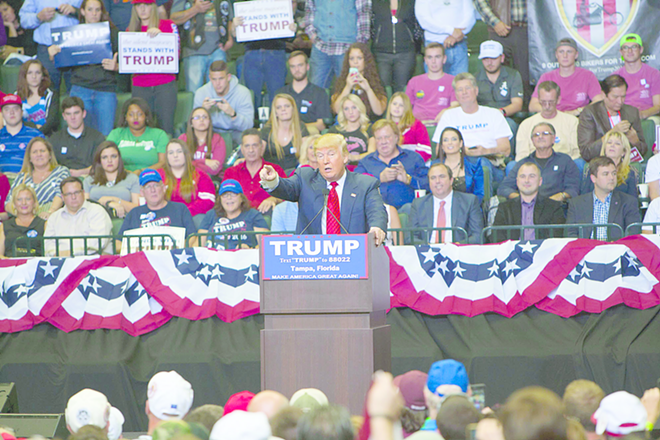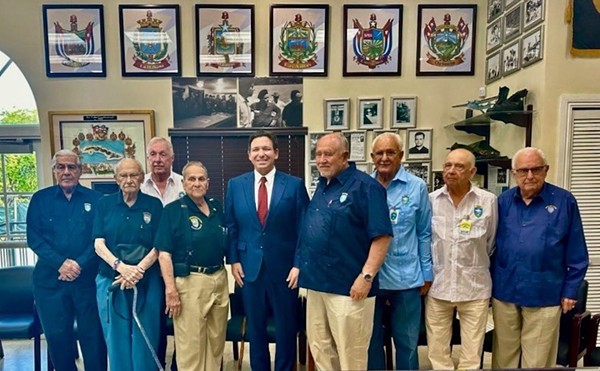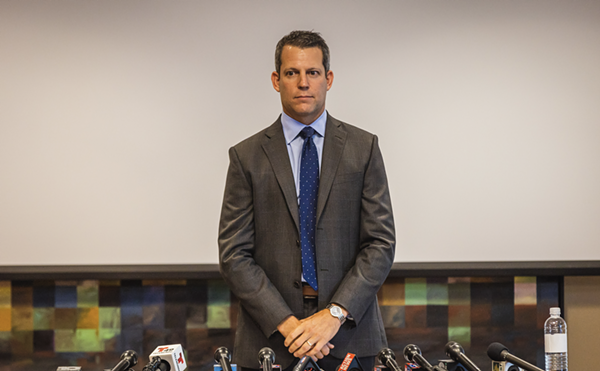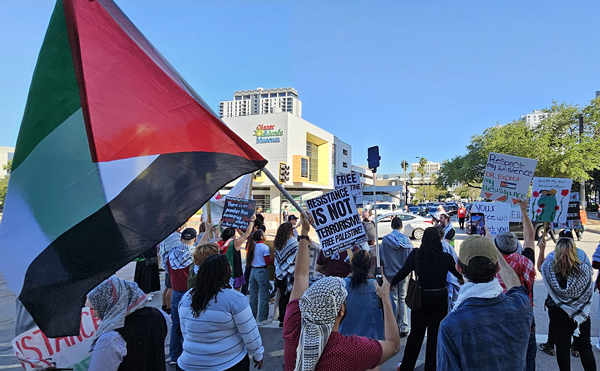
As a local pastor cited a litany of reasons he supports presidential frontrunner Donald Trump, who was to stand at that same podium within an hour, TV news cameras turned to the opposite end of the standing-room-only arena floor, where a group of young guys appeared on the verge of a frenzy.
“Build that wall! Build that wall! Build that wall!” they shouted in unison at the camera.
They were just a few of the more than 10,000 enthused Trump supporters at his recent rally at the USF Sun Dome, and many more rallied outside, providing a counterpoint to the many protesters who object to Trump’s framing of issues like immigration and terrorism.
Minutes later, a local conservative talk-radio host warmed up the crowd, targeting political foes and making jokes at the expense of the far right’s most popular whipping boys (suggesting that migrants from Mexico and Central America cross into the U.S. by walking into the Gulf of Mexico, that sort of thing).
Trump, of course, followed suit, criticizing President Obama’s so-called weak approach to dealing with strife in the Middle East and doubling down on his claim that he could make Mexican President Enrique Pena Nieto, whose name he said he couldn’t remember — and didn’t care to — pay for a wall along the U.S.-Mexico border.
“Build that wall! Build that wall! Build that wall!” he chanted, and thousands of voices joined in.
It isn’t hard to pick up on the subtext here. Fear and hate of the “other,” the swarthy scapegoat for the perceived loss of the American Dream, resounded quite clearly that night, drowning out any sense of context.
But those who study migration patterns and foreign policy say while such messaging can be appealing in its simplicity, it’s far from accurate.
“I really do believe what’s driving this debate is a situation that we see historically where you have reactions to migration that allow politicians to demagogue the issue, to mobilize people around fear, and often unfounded fears,” said University of South Florida Professor of Government and International Affairs M. Scott Solomon. “Just looking at it from a historical and scholarly perspective, you have a kind of new variant of this sort of demagoguing around the ‘other,’ around migrants. There’s obviously a real correlation between that and the electoral cycle, which might tell you a little about the motivation.”
On Thursday, Solomon will speak as part of a panel discussion on immigration at St. Petersburg in the World, a conference that brings together academics, public officials and others from around the globe to talk about a broad range of issues over three days at USF St. Petersburg.
Now in its fourth year, the event is something of an antidote to the fearful rhetoric heard often on the campaign trail.
As part of the panel, called “Immigrants: A New Wall or a New Screen Door?” Solomon hopes to stress key messages that often get lost in the shuffle of soundbite politics.
For one, he said, demonizing immigrants the way Trump and his GOP cohorts have is nothing new — migrant populations from Ireland, Germany, Japan and China all suffered prejudice at some point as they tried to make new lives in the U.S. Many of those people who want to deport undocumented immigrants are descended from populations that faced similar antipathy.
“Something that I point out to my students a lot is that, unless you are 100 percent Native American, you are a product of a migration journey,” Solomon said.
Plus, he said, compared to other parts of the world, there really isn’t much of a problem.
“There is a political debate in the United States about migration, but we do not have a migration crisis in the United States. There is a migration crisis, a real one, in Europe,” he said.
That current crisis stems from turmoil in the Middle East, where fighting in Afghanistan, Iraq and Syria has displaced millions.
In the United States, despite fears that migrants are crossing the border and stealing jobs (or driving down wages), the research tells a different story; namely, if industries have a glut of jobs they need to fill, they’ll look south of the border.
“There’s often the fear of migrants, particularly low-skilled migrants, impacting wages. Well, the scholarship on that is pretty clear,” he said. “There seems to be little to no effect on wages from migration. The reason people often think there’s going to be an impact on wages is that people… indulge in a lump-sum fallacy that there's a fixed amount of jobs. Obviously, market economies are dynamic: they grow and they contract. The United States economy kind of pushes and pulls migrants.”
He cites the housing boom and bust of a decade ago as an example.
“We saw an increase in migration from Mexico, probably most of it, during the construction boom and the rise of the real-estate market,” Solomon said. “And then after the economic crisis of 2007, 2008, with the kind of deflation of the housing bubble, we saw declines in numbers of undocumented migrants from Mexico. People were returning to Mexico because jobs weren’t [here].”
But despite the data that’s out there, pundits persist in claiming that immigrants, particularly undocumented ones, are hurting the economy, and the fact that there are so many people up in arms about a “crisis” that really might not be all that bad points to a deeper issue among the American electorate.
“We have a term we use: low-information voters,” Solomon said. “That could mean uneducated or it could mean educated but not very informed about the politics, political debates and policy. And there’s the debate about why there’s a significant amount of low-information voters. Is it that people are discouraged because they don’t feel like they have any individual efficacy? They don’t feel like their vote matters, that the system is rigged and it’s all run by elites, that kind of thing. We have elements of that on both sides.”
The recent debate over the acceptance of thousands of Syrian refugees (though not very many in Florida) is another case in point. That debate has made its way to the Florida legislature by way of proposed laws that “would prevent state or local government agencies from taking part in resettlement efforts for refugees or immigrants from parts of the world where terrorists are known to originate or train,” according to the News Service of Florida.
Trump (as well as Texas Senator and presicential frontrunner Ted Cruz) has called for a registry to include all Muslims in the U.S., and has even said he wants to ban all Muslims from traveling to the U.S.
Thomas Badey, a political science professor at Randolph-Macon College in Virginia, has a word for such proposed policies.
“Quite frankly, I would argue, nonsensical,” he said. “How do you know somebody’s a Muslim? What do you do? Ask them?”
Badey, an expert on terrorism, is also taking part in a panel discussion Friday at St. Petersburg in the World on relations between the U.S. and Iran in the wake of last year’s nuclear deal.
It’s titled “Iran after the Nuclear Agreement: Are We Riding the Back of the Tiger?”
That agreement, he said, is not really getting a fair shake by politicians on the campaign trail, who have taken to calling it weak and even potentially detrimental.
At his Tampa rally, Trump made mention of the deal, criticizing President Obama for unfreezing tens of millions in Iranian assets. Trump framed that aspect of the agreement as a giveaway to the nation, which Badey said is dead wrong.
“A lot of people said, well, we shouldn’t have given them money,” Badey said. “Well, we didn’t give them money. We gave them back their money.”
He said fears over the deal are relatively unfounded, that there seems to be adequate intelligence to help determine whether the country will circumvent the deal by developing a nuclear weapon. If the Iranians don’t comply with the deal, they’ll face more tough sanctions, something the economically depressed country probably wouldn’t want to risk.
“They are aware of the fact that we can reimpose sanctions at any time if they don’t live up to the agreement,” Badey said. “In the immediate, there has been some relief because the Iranian economy has been in decline. With the price of oil at $27 a barrel, it’s going to be a challenge for them to maintain any economic recovery for the long term. So that will make them less likely to not honor some of the things in the agreement.
“There’s more mistrust of us than mistrust of them that’s going to determine how they react. And they have reasons to mistrust us. There’s a long history [there]... We overthrew the elected government in 1953 with a CIA plot. We supported the oppressive Shah of Iran for a number of years, who had a secret police that killed and tortured people,” Badey said. “We sold weapons to Saddam Hussein so he could kill Iranians and attack Iranians during the Iran-Iraq War. At the same time we secretly sold weapons to Iran. So I can understand [Ayatollah] Homeini’s hesitance in believing anything the United States says.”
Much like the discussion over immigration, Badey said he hopes one silver lining will be a better understanding of one another rather than the polemics that currently dominate the dialogue.
“We’ve had a long and complex relationship with the Iranians,” he said. “And there’s fault on both sides. And if there’s a good thing that comes out of this treaty, it’s that it may provide an opportunity to change some of the misconceptions about each other on both sides.”
St. Petersburg in the World takes place at USF St. Petersburg, through Fri., Feb 20. Check stpetersburgintheworld.com for discussion times and a full list of speakers.
















